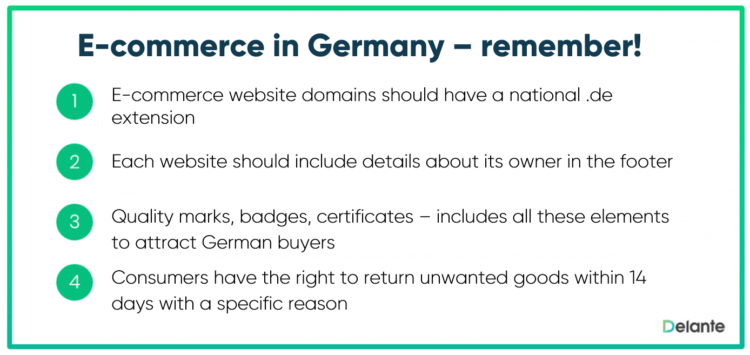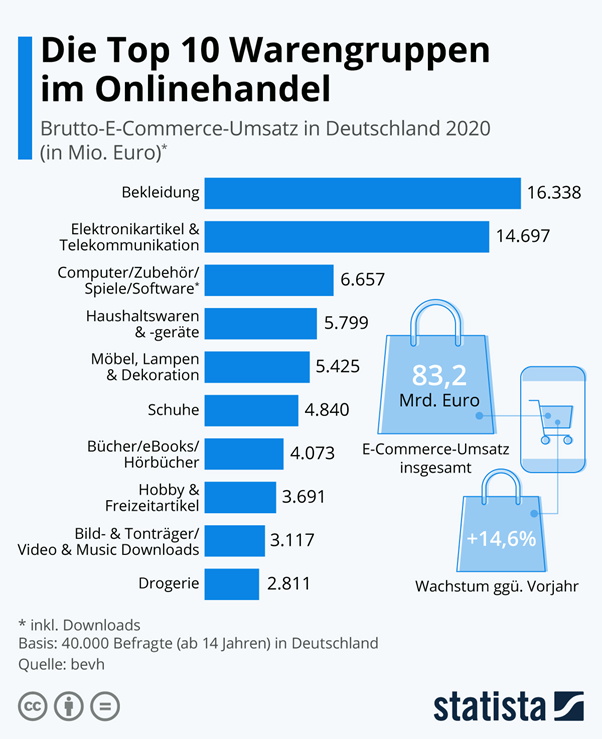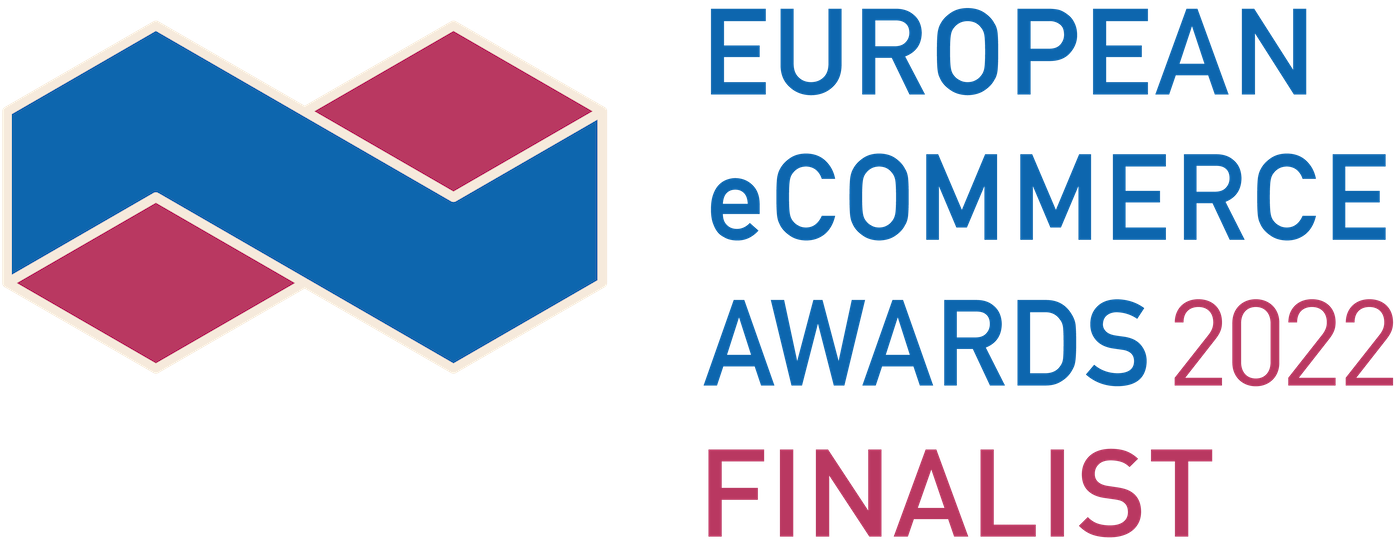- Germany’s E-commerce Market
- German E-commerce Market Size
- German E-buyers
- What Devices Do German Customers Use?
- The Most Popular Web Browsers and Search Engines in Germany
- Germans' Favorite Payment Methods
- The Most Popular Delivery Methods in Germany
- Germany's Biggest E-commerce Stores
- What Do German People Buy the Most?
- What Social Media Platforms Do Germans Use?
- What Are Other Channels for Reaching Customers?
- E-commerce in Germany - The Takeaway
Germany’s E-commerce Market
Let's begin with answering the very first question that comes to mind when talking about e-commerce - is online shopping even popular in Germany? Yes, e-commerce in Germany is popular and doing well. As many as 94% of Germans actively use the internet, and 83% of them buy something online at least once a year. So, how many people exactly use e-commerce in Germany? With a population of around 84 million people, almost 69 million Germans are shopping online - that's a big market with great opportunities to explore. And how often do Germans shop online? In 2020, according to Statista - 29% of German consumers shopped online at least once a week, and 31% at least once a month. There is no doubt that Germans like shopping online and that investing in this market if done right, can be very profitable. One of the best channels to reach potential customers are social media platforms - 78.7% of Germans use them regularly. Every day, an average German spends almost 5.5 hours online, so you have a lot of time to attract their attention. To make sure you have a great start in the German e-commerce market we dived deeper into the details.German E-commerce Market Size
The e-commerce market in Germany is steadily growing each year, reaching €99 billion in 2021. [caption id="attachment_50917" align="aligncenter" width="750"] Source: https://www.statista.com/statistics/434303/consumer-goods-e-commerce-revenue-germany/[/caption]
Compared to the year 2020, revenue increased by 19% in 2021, which is a bigger growth than a year before - 14.6 percent. This trend is predicted to continue, as e-commerce is growing in popularity everywhere in the world, and German market is not an exception to this rule.
Source: https://www.statista.com/statistics/434303/consumer-goods-e-commerce-revenue-germany/[/caption]
Compared to the year 2020, revenue increased by 19% in 2021, which is a bigger growth than a year before - 14.6 percent. This trend is predicted to continue, as e-commerce is growing in popularity everywhere in the world, and German market is not an exception to this rule.
German E-buyers
If you consider selling on the German market, you should keep cultural differences in mind. Trust, loyalty, familiarity, quality, and security are core values for German customers. As reliable traders are loved by German citizens, international sellers should strive to adapt their online stores to local communities (i.e. e-commerce website domains should have a national .de extension). Apart from that, each website should include details about its owner in the footer. Quality marks, badges, certificates - all these elements should attract German buyers. Note that according to German law, consumers have the right to return unwanted goods within 14 days for a specific reason. This applies to almost all goods. Items that aren’t subject to returns are custom-made products, hygiene products, e-books, games, CDs/DVDs, and event tickets. You have to expect that the number of product returns in Germany will certainly be higher than in countries without such regulations.
What Devices Do German Customers Use?
Mobile is very important here. There are more than 112 million active smartphones in Germany and 95% of people use them. If your online store isn't mobile-friendly, it's high time to optimize the website, UX and UI. These should be your first steps before going international. Apart from smartphones, Germans use:- laptops and desktops (83.8%)
- tablets (52.7%)
- game consoles, e.g. Playstation, Xbox (37.9%)
- smart TVs (24.3%)
- smartwatches and smart bands (23.9%)
The Most Popular Web Browsers And Search Engines in Germany
Why do you need this information? Because it’ll help you optimize your online store and test implemented solutions before you interact with e-customers. Which web browsers are most commonly used in Germany?- Google Chrome (48,4%)
- Safari (22,1%)
- Firefox (11,9%)
- Microsoft Edge (5,9%)
- Samsung Internet (5,6%)
- Opera (3,4%)
- Internet Explorer and others (2,7%)
Germans' Favorite Payment Methods
How do German customers pay for online purchases? The statista.com data from 2020 may be surprising. PayPal and similar online payment methods come first, with 48% of the market share. Next, we have invoices, traditional transfers (21%), and debit cards (19%).The Most Popular Delivery Methods in Germany
According to data from the "European E-commerce Report 2019" 77% of customers in Germany prefer Deutsche Post DHL, the national carrier that delivers postal and courier shipments and has its own Packstation parcel machines. Personal pickup (21%), UPS (16%), DPD (15%) and GSL (7%) are other popular options chosen by German e-customers.Germany's Biggest E-commerce Stores
Where to look for inspiration when it comes to German online stores? Who is the absolute top of the top in Germany's e-commerce market? According to ecommercedb.com, the biggest .de online stores are:- Amazon.de
- Otto.de
- Zalando.de
- MediaMarkt.de
- Lidl.de
What Do German People Buy the Most?
The fashion segment has the greatest potential for online sales, according to Statista. German internet users spend a lot on clothes. Electronic and telecommunication goods are also very popular. Computers, mobile devices, and software are also in the ranking. These aren't surprising choices, as we see similar preferences in other European countries.
What Social Media Platforms Do Germans Use?
Here's the data from the Digital 2021 Germany report from Hootsuite: WhatsApp is the leader here (79.6%). It clearly wins over Facebook's Messenger (37.3%). In addition, Germans use social media such as:
WhatsApp is the leader here (79.6%). It clearly wins over Facebook's Messenger (37.3%). In addition, Germans use social media such as:
- YouTube (74,8%)
- Facebook (60,0%)
- Instagram (46,9%)
- Pinterest (26,8%)
- Twitter (22,8%)
What are Other Channels for Reaching Customers?
It turns out that TV and search engines have the greatest potential when it comes to influencing the customers' purchase decisions.
E-commerce in Germany - The Takeaway
What Challenges Do Online Stores in GermanyFace? According to experts, e-commerce is gaining popularity due to the continuous improvement of UX (user experience). Apart from that, cashless payments are simply convenient. Thanks to them, the purchasing process is efficient. Buyers don't have to go to their bank accounts. The customer can pay the entire amount right away, postpone the payment or pay it in installments. German customers value easy returns, low prices, and fast delivery. This is exactly what e-commerce platforms should focus on if they want to attract attention and satisfy Germans. German tycoons offer safe and instinctive purchasing of goods, smooth and fast checkout, and intuitive platforms. Germany is one of the top e-commerce markets in Europe and should be seen as such by growth-oriented international e-commerce owners. Although Germany's e-commerce market is demanding, it gives huge opportunities to online store owners.Find out how we can help you with international SEO services - let's conquer new markets together!













